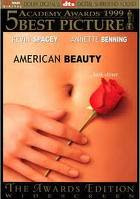In Magnolia we can all see ourselves in the characters portrayed. The film presents nine different story lines which ultimately merge into one story. What drives the heart of this film is the idea that there is nothing you have done or not done that cannot be forgiven, no matter what your past is or what acts you have committed that you believe are beyond redemption. It’s a powerful statement that embraces the idea that in order for human beings to find peace, they must seek forgiveness.
American Beauty is a film that most Christians found extremely offensive. Lester Burnham is a middle-aged man who has lost the ability to feel anything in life. His existence is defined by the mundane aspects of everyday life until he has an encounter with his teenager daughter’s best friend. Although he never acts on his impulse, he does lust after her. The film offers a hard look at life in America’s suburbia. The story is really about our own self-made imprisonment in cages that we build ourselves. What our character discovers about life is that the mundane things are really the things that we should be most grateful for but are often the things we overlook. It’s the daily experiences of life that define who we are. Beauty therefore can be found in just the process of living. Needless to say, audiences identified with Lester’s character and in his pursuit to find the beauty of life. The movie is a search for purpose and meaning. American Beauty uses the catalyst of an improper relationship, which finally wakes Lester up to realize that fulfillment cannot be found in the lust for flesh . It can only be found in the pursuit of living life.




No comments:
Post a Comment